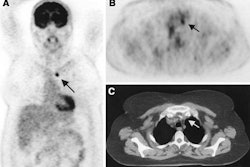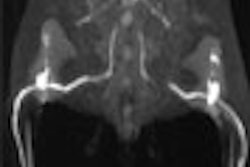SAN DIEGO - A study by surgical oncologists at the University of Pennsylvania in Philadelphia challenges the routine use of postoperative irradiation for the treatment of stage I and II thymoma.
"There is really no evidence to support routine radiation therapy for these patients," said lead investigator Dr. Sunil Singhal Friday at the annual meeting of the Society of Thoracic Surgeons. Singhal added that there is general agreement among surgeons and radiation oncologists that all stage III patients require adjuvant radiotherapy, but "there is little agreement about the need for radiotherapy in early-stage disease."
He said the retrospective study found "no improvement in survival and no difference in recurrence when we compared patients who received postoperative irradiation and those who didn’t receive it."
Moreover, among patients who do have recurrences "the recurrence is usually well outside of the portal of treatment," Singhal said.
Singhal and colleagues conducted a review of 167 patients who underwent resections for thymoma between 1992 and 2000. Seventy of the patients were determined intraoperatively to have tumors in stage II or less. All of these patients underwent complete resection.
"Forty-six patients had transcapsular microscopic invasion or macroscopic invasion into surrounding fatty tissue, so they were identified as stage II, and 24 thymomas had less than transcapsular microinvasion and so were clearly stage I," Singhal said.
Forty-seven patients had surgery without postoperative mediastinal radiotherapy, and 23 patients were treated with surgery followed by radiotherapy. The average tumor size was 5.2 cm in the group that had surgery without irradiation and 5.4 cm in the irradiated group. Three of the patients receiving radiotherapy were stage I, he said. The dose consisted of 45-55 Gy over 5 to 6.5 weeks. The median follow-up was 65.3 months.
"One patient in the radiotherapy group recurred, as did one patient in the surgery-alone group," Singhal said. "One recurrence was in an unradiated stage I patient and one was in a radiated stage II patient."
Such results indicate that surgeons, not radiation oncologists, should initiate orders for induction or adjuvant radiation therapy, said Dr. Cameron Wright, associate professor of surgery at Massachusetts General Hospital in Boston. In his commentary on the study, Wright said that postoperative radiation therapy is "overrated and often ill-advised. Pneumonitis occurs in about 8% of irradiated patients, and there are also increased risks for esophageal strictures and coronary disease."
Moreover, Wright said that radiation adds unnecessary expense to the cost of treating thymoma.
While Wright was openly critical of postoperative irradiation, he did point out that "with only six years follow-up, this study does not really address the issue of recurrences. Thymoma recurrences often occur closer to 10 years after initial treatment," he said. Wright also said that even supporters of postoperative irradiation "agree it is not necessary for stage I disease."
By Peggy PeckAuntMinnie.com contributing writer
February 3, 2003
Related Reading
Studies illustrate benefits of FDG-PET, pre-planning in radiotherapy, January 27, 2003
Heavy-ion radiotherapy feasible for inoperable lung cancer, January 21, 2003
Reference 42 lung cancer discussion, August 29, 2001
Copyright © 2003 AuntMinnie.com



















